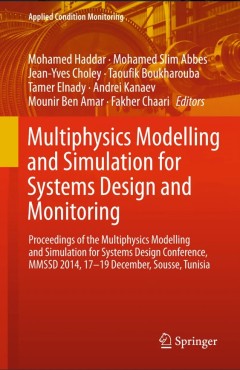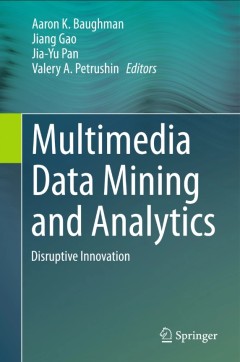Filter by

Natural Gas and Renewable Methane for Powertrains : Future Strategies for a C…
This book focuses on natural gas and synthetic methane as contemporary and future energy sources. Following a historical overview, physical and chemical properties, occurrence, extraction, transportation and storage of natural gas are discussed. Sustainable production of natural gas and methane as well as production and storage of synthetic methane are scrutinized next. A substantial part of th…
- Edition
- 1
- ISBN/ISSN
- 978-3-319-23224-9
- Collation
- XI, 482
- Series Title
- Powertrain
- Call Number
- -

Multiphysics Modelling and Simulation for Systems Design and Monitoring
This book reports on the state of the art in the field of multiphysics systems. It consists of accurately reviewed contributions to the MMSSD’2014 conference, which was held from December 17 to 19, 2004 in Hammamet, Tunisia. The different chapters, covering new theories, methods and a number of case studies, provide readers with an up-to-date picture of multiphysics modeling and simulation. T…
- Edition
- 1
- ISBN/ISSN
- 978-3-319-14531-0
- Collation
- XII, 555
- Series Title
- Applied Condition Monitoring
- Call Number
- -

Modelling Public Transport Passenger Flows in the Era of Intelligent Transpor…
This book shows how transit assignment models can be used to describe and predict the patterns of network patronage in public transport systems. It provides a fundamental technical tool that can be employed in the process of designing, implementing and evaluating measures and/or policies to improve the current state of transport systems within given financial, technical and social constraints. …
- Edition
- 1
- ISBN/ISSN
- 978-3-319-25080-9
- Collation
- XXXVII, 641
- Series Title
- Springer Tracts on Transportation and Traffic
- Call Number
- -

Multimedia Data Mining and Analytics
This book provides fresh insights into the cutting edge of multimedia data mining, reflecting how the research focus has shifted towards networked social communities, mobile devices and sensors. The work describes how the history of multimedia data processing can be viewed as a sequence of disruptive innovations. Across the chapters, the discussion covers the practical frameworks, libraries, an…
- Edition
- 1
- ISBN/ISSN
- 978-3-319-14997-4
- Collation
- XIV, 454
- Series Title
- -
- Call Number
- -

Empirical Modeling and Data Analysis for Engineers and Applied Scientists
This textbook teaches advanced undergraduate and first-year graduate students in Engineering and Applied Sciences to gather and analyze empirical observations (data) in order to aid in making design decisions. While science is about discovery, the primary paradigm of engineering and "applied science" is design. Scientists are in the discovery business and want, in general, to understand the …
- Edition
- -
- ISBN/ISSN
- 978-3-319-32768-6
- Collation
- 40 b/w illustrations, 61 illustrations in colour
- Series Title
- -
- Call Number
- -

The Twenty-first Century in Space
This final entry in the History of Human Space Exploration mini-series by Ben Evans continues with an in-depth look at the latter part of the 20th century and the start of the new millennium. Picking up where Partnership in Space left off, the story commemorating the evolution of manned space exploration unfolds in further detail. More than fifty years after Yuri Gagarin’s pioneering journey …
- Edition
- -
- ISBN/ISSN
- 978-1-4939-1307-7
- Collation
- -
- Series Title
- -
- Call Number
- -

The Twenty-First Century Commercial Space Imperative
Young addresses the impressive expansion across existing and developing commercial space business markets, with multiple private companies competing in the payload launch services sector. The author pinpoints the new markets, technologies, and players in the industry, as well as highlighting the overall reasons why it is important for us to develop space. NASA now relies on commercial partners …
- Edition
- -
- ISBN/ISSN
- 978-3-319-18929-1
- Collation
- -
- Series Title
- -
- Call Number
- -

Mobile and Wireless Technology 2015
This book provides a snapshot of the current state-of-the-art in the fields of mobile and wireless technology, security and applications. The proceedings of the 2nd International Conference on Mobile and Wireless Technology (ICMWT2015), it represents the outcome of a unique platform for researchers and practitioners from academia and industry to share cutting-edge developments in the field of …
- Edition
- 1
- ISBN/ISSN
- 978-3-662-47668-0
- Collation
- X, 214
- Series Title
- Lecture Notes in Electrical Engineering
- Call Number
- -

Modified Au-Based Nanomaterials Studied by Surface Plasmon Resonance Spectros…
This work pursues a novel route to functionalizing large surfaces with hybrid nanoparticles. It also casts new light on the combined use of surface plasmon resonance and X-rays. SPR spectroscopy is employed to study Au-based plasmonic nanostructures fabricated by novel methods, and a new experimental device is developed combining SPR with X-ray absorption spectroscopy at a synchrotron beamline.…
- Edition
- 1
- ISBN/ISSN
- 978-3-319-37016-3
- Collation
- XIX, 183
- Series Title
- Springer Theses
- Call Number
- -

The Tomato Genome
This book describes the strategy used for sequencing, assembling and annotating the tomato genome and presents the main characteristics of this sequence with a special focus on repeated sequences and the ancestral polyploidy events. It also includes the chloroplast and mitochondrial genomes. Tomato (Solanum lycopersicum) is a major crop plant as well as a model for fruit development, and the av…
- Edition
- -
- ISBN/ISSN
- 978-3-662-53389-5
- Collation
- -
- Series Title
- -
- Call Number
- -
 Computer Science, Information & General Works
Computer Science, Information & General Works  Philosophy & Psychology
Philosophy & Psychology  Religion
Religion  Social Sciences
Social Sciences  Language
Language  Pure Science
Pure Science  Applied Sciences
Applied Sciences  Art & Recreation
Art & Recreation  Literature
Literature  History & Geography
History & Geography